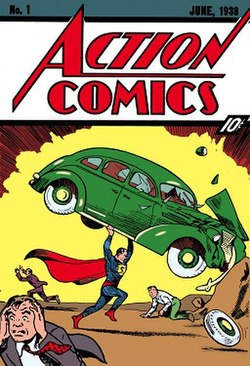Action Comics
| Action Comics | |
|---|---|

|
|
| Publication information | |
| Publisher | DC Comics |
| Schedule |
List
|
| Format | Ongoing series |
| Genre | |
| Publication date |
List
|
| Number of issues |
List
|
| Main character(s) | Superman |
| Creative team | |
| Writer(s) | |
| Penciller(s) |
List
|
| Inker(s) |
List
|
| Collected editions | |
| Superman Chronicles Vol 1 | |
| Superman Chronicles Vol 2 | |
| Superman in the Forties | |
| Archives Vol 1 | |
| Archives Vol 2 | |
| Archives Vol 3 | |
| Archives Vol 4 | |
| Archives Vol 5 | |
Action Comics is an American comic book series that introduced Superman, one of the first major superhero characters as the term is popularly defined. The publisher was originally known as National Allied Publications, and later as National Comics Publications and as National Periodical Publications, before taking on its current name of DC Comics. Its original incarnation ran from 1938 to 2011 and stands as one of the longest-running comic books with consecutively numbered issues. A second volume of Action Comics with issue #1 ran from 2011 to 2016. Action Comics returned to its original numbering beginning with issue #957 (Aug. 2016).
Jerry Siegel and Joe Shuster saw their creation, Superman (also known as Kal-El, originally Kal-L), launched in Action Comics #1 on April 18, 1938 (cover dated June), an event which began the Golden Age of Comic Books. Siegel and Shuster had tried for years to find a publisher for their Superman character originally conceived as a newspaper strip without success. Superman was originally a bald madman created by Siegel and Shuster who used his telepathic abilities to wreak havoc on mankind. He appeared in Siegel and Shuster's book Science Fiction. Siegel then commented, "What if this Superman was a force for good instead of evil?" The writer and artist had worked on several features for National Allied Publications' other titles such as Slam Bradley in Detective Comics and were asked to contribute a feature for National's newest publication. They submitted Superman for consideration and, after re-pasting the sample newspaper strips they had prepared into comic book page format, National decided to make Superman the cover feature of their new magazine. After seeing the published first issue, publisher Harry Donenfeld dismissed the featured strip as ridiculous and ordered it never to be on the cover of the series again. Subsequent reports of the first issue's strong sales and follow up investigations revealed that Superman was the reason, thus the character returned to the covers, becoming a permanent presence in issue 19 onward.
...
Wikipedia
